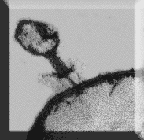(Antibiotic resistance)
Cath O'Driscoll. Chemistry and Industry.
Full Text: COPYRIGHT 2007 Society of Chemical Industry
Harnessing the channel-forming power of certain bacteriophages, viruses that
target bacteria, could be useful for fighting resistant disease. Scientists
have discovered that some types of bacteriophages can boost antibiotic
effectiveness, lowering the doses required against some pseudomonas
bacteria--involved in diseases from pneumonia to blood infections--by up to 50
times.
Microbiologist Steven Hagens, previously at the
'Pseudomonas bacteria are particularly multi-resistant to antibiotics
because they have efflux pump mechanisms that enable them to throw out
antibiotics. A pore in the cell wall would obviously cancel the efflux effect,'
according to
Dose-lowering effects were also observed with the antibiotic tetracycline.
And doses of gramicidin were lower with E. coli bacteria in the presence of
phages, although in this case the effect was not measurable because this
particular, nonresistant, E. coli strain was already highly sensitive to the
antibiotic.
Hagens and coworkers recently reported that 75% of mice infected with a
lethal dose of pseudomonas survived if the antibiotic gentamicin was
administered in the presence of bacteriophages. None survived without the
bacteriophages (Microb. Drug Resist. 2006, 12 (3), 164).
'Given the current lack of antibacterials with good anti-Gramnegative
activity, the prospect of using such treatments to prolong the life of existing
agents and delay the onset of widespread resistance is very much to be
welcomed,' commented Jim Spencer, a lecturer in microbial pathogenesis at the
University of Bristol. 'Of particular interest is the authors' proposal that
the sensitisation occurs through expression of phage proteins that form
membrane-bound pores required for the extrusion of viral progeny, as much of
the resistance of Gram-negative pathogens such as P. aeruginosa arises from
their impermeability.'
The new approach could be particularly useful for treating food poisoning,
because the lower doses of antibiotic needed would be unlikely to disrupt the
friendly bacteria in the gut--a problem with conventional antibiotic
treatments.
Phage therapy
has been used since the 1920s. But the big drawback is that they must be
matched perfectly to the exact strain of bacteria. '[Our method] wouldn't
necessarily be any better, but if you don't find any useful phages, you could
use these [channel-forming types] instead,' said
With the increases in bacterial resistance, phages can only get more
popular. Although bacteria can become resistant to both antibiotics and phages,
phages are themselves capable of adapting and so new varieties should be
available to outwit the bacteria.
An Indian company Gangagene did plan to pursue the phage work, but
subsequently went bust. *
